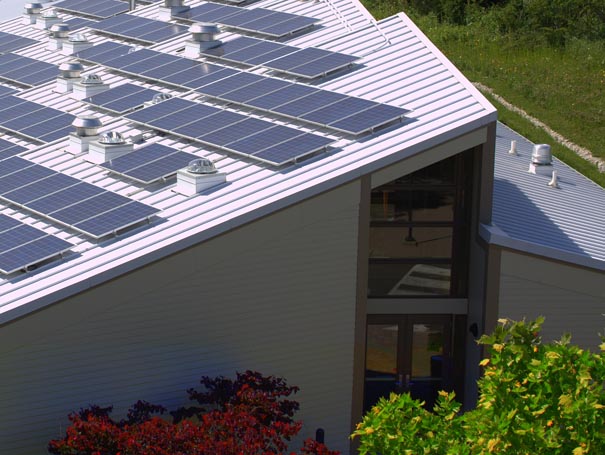The NJSEA has led by example in the use of renewable energy and other energy efficiency measures, such as green building, that improve and protect the environment by reducing reliance on fossil fuels; save energy costs; create jobs; and put otherwise fallow land to productive use.
In 2011, the agency sponsored the creation of the first solar farm constructed on a State-owned landfill. The NJSEA 1A Landfill in Kearny is home to a 3-megawatt installation that includes 12,506 photovoltaic panels mounted on 13 acres atop the closed 35-acre landfill. The solar farm, visible from the New Jersey Turnpike, is owned and operated by PSE&G under a 20-year lease agreement with the NJSEA that expires in 2031.
The NJSEA Center for Environmental and Scientific Education (Science Center) in DeKorte Park was the first public building in New Jersey to achieve Leadership in Energy and Environmental Design (LEED) Platinum certification – the highest rating, from the U.S. Green Building Council.
The Science Center’s sustainable features include 165 rooftop solar panels that generate approximately 40 percent of the building’s electricity needs, solar ceiling tubes that maximize the use of natural daylight, recycled building materials, and energy-efficient heating and lighting systems.
In addition, a 120-kilowatt solar carport canopy covers part of the NJSEA’s administration building parking lot. The 504 solar panels provide about 20 percent of the electricity needs of the building.
Under the program, Little Ferry installed rooftop solar panels on its Municipal Building, Library and Senior Center. In Secaucus, rooftop and ground-mounted solar projects were completed at Town Hall, Secaucus High School/Middle School and Huber Elementary School. The agency’s work on behalf of the municipalities helped to defray solar energy development costs that would otherwise have fallen to taxpayers.
The NJSEA also promotes the use of renewable energy and other energy efficiency measures by offering incentives to companies and developers whose projects include aspects of sustainable building practices, such as solar power and energy-efficient heating and lighting systems. Benefits include reduced fees for zoning certificate and plan review applications as well as priority reviews.

Developers and businesses that build to LEED standards receive the following incentives:
• 30 percent refund of required zoning fees for Platinum certification
• 25 percent refund of required zoning fees for Gold certification
• 20 percent refund of required zoning fees for Silver certification
• 15 percent refund of required zoning fees for certification
• Priority review of applications for development
• Density bonuses and additions
Learn more about Green Building in the Meadowlands.